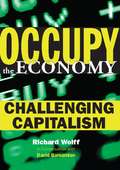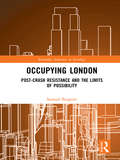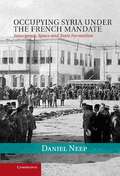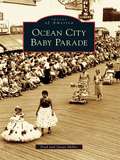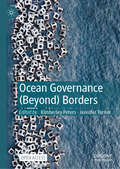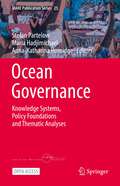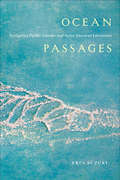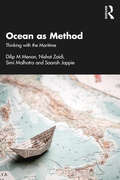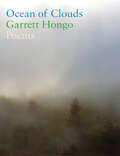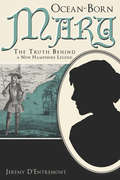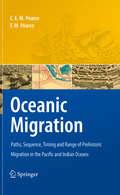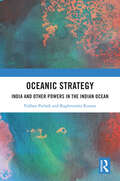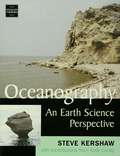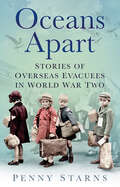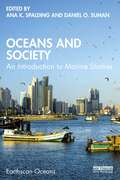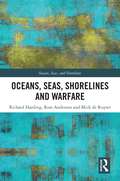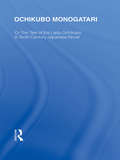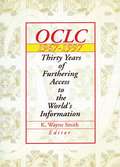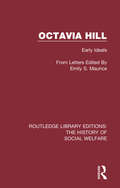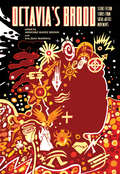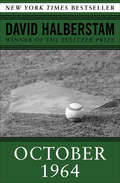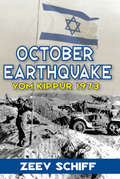- Table View
- List View
Occupy the Economy
by David Barsamian Richard D. WolffToday's economic crisis is capitalism's worst since the Great Depression. Millions have lost jobs, homes, and healthcare. Many with jobs watch pensions, benefits, and job security decline. While most live with increasing uncertainty, the system makes the very wealthy even richer. In eye-opening interviews with prominent economist Richard Wolff, David Barsamian probes the root causes of the current crisis, its unjust social costs, and what can and should be done to turn things around. While others blame corrupt bankers and unregulated speculators or the government or even the poor who borrowed, the authors show that the causes of the crisis run much deeper. They reach back to the 1970s when the capitalist system itself shifted, ending the century-old pattern of rising wages for Americans and thereby enabling the top 1% to become ultra-rich at the expense of the 99%. Since then, economic injustice has become chronic and further corrupted politics. Occupy's indignation with the whole system mobilizes a diverse range of Americans who seek basic change. Occupying the Economy not only clarifies and analyzes the crisis in US capitalism today, it also points toward solutions that can shape a far better future for all.Richard Wolff is professor of economics at U. Mass, and visiting professor at the New School in New York City. He hosts a program on WBAI and is author of the hit book Capitalism Hits the Fan.David Barsamian is director of Alternative Radio and author of many interview books, including What We Say Goes with Noam Chomsky.
Occupying Aging
by Katherine SchneiderPerhaps you’re one of the forty million Americans over sixty-five or the 76 million Americans called baby boomers who are joining the over sixty-five set at a rate of 8,000 per day. I’m one of you and would love to take you on a ride with me through a full year of occupying aging. I’ve been blind since birth and have had fibromyalgia for over twenty years, so I’ve struggled with disabilities and society’s disabling attitudes long enough to have learned a few tricks of the trade. As you’ll see if you tag along, sometimes they work and sometimes…I’m not sure who first said “if it doesn’t kill you, it’ll make you stronger” but I could have that as my motto. The year is full of delightful people and events, as well as tears and laughter. The other major characters in this journal are my Seeing Eye dogs past and present. They’d encourage you to read the book because then at least some good will come of my spending so much time tapping on the keyboard of my talking computer. Welcome to my year of occupying aging. I hope it encourages you in occupying your life at whatever stage in the journey of life you are.
Occupying London: Post-Crash Resistance and the Limits of Possibility (Routledge Advances in Sociology)
by Samuel BurgumJust because there has been a crisis does not necessarily mean there is going to be a change. And yet why, exactly, did nothing change in the face of global resistances and movements which followed the financial meltdown of 2007/8? Based on ethnographic research with the Occupy movement in London – as a case study of one post-crash attempt to bring alternatives about – this book argues that change was ultimately foreclosed by widespread ‘common sense’ limitations of what was considered possible after the crash. Offering a critically constructive analysis of the Occupy movement in London and incorporating both activist praise and self-criticism of their movement, Occupying London discusses both the political potential suggested by the occupation of space and the slogan ‘we are the 99%’, as well as the problematic extension of post-crash normativity into the movement through issues of organisation, repetitions of wider norms, and an inadvertent acceptance of wider distributions of possibility. Such positives and negatives are shown to have played out in a wide-range of arenas: from the occupation of space itself, through attempts to organise collective appearance and voice, as well as ‘authentic’ constructions of resistance and ‘cynical’ framings of power. The author’s intention is to provoke thought on behalf of any ‘half-fascinated, half-devastated witnesses’ of the financial crash and the political disappointments which followed. It is argued that such movements possess the potential to bring about progressive change, but only if they intervene into wider distributions of ‘common sense’ by embracing collective symbolic efficiency and avoiding binary framings of ‘authentic’ resistance vs. ‘hidden’ power.
Occupying Syria under the French Mandate
by Daniel NeepWhat role does military force play during a colonial occupation? The answer seems obvious: coercion crushes local resistance, quashes political dissent, and consolidates the dominance of the occupying power. However, as this discerning and theoretically rigorous study suggests, violence can have much more ambiguous consequences. Set in Syria during the French Mandate from 1920 to 1946, the book explores a turbulent period in which conflict between armed Syrian insurgents and French military forces not only determined the strategic objectives of the colonial state, but also transformed how the colonial state organised, controlled, and understood Syrian society, geography, and population. In addition to the coercive techniques of airpower, collective punishment, and colonial policing, the book shows how civilian technologies such as urban planning and engineering were also commandeered in the effort to undermine rebel advances. In this way, colonial violence had a lasting effect in Syria, shaping a peculiar form of social order that endured well after the French occupation. As the conclusion surmises, the interplay between violence, spatial colonisation, and pacification continues to resonate with recent developments in the region.
Ocean City Baby Parade
by Susan Miller Fred MillerThe Ocean City Baby Parade is the longest continuously held baby parade in the nation, tracing back to August 10, 1901, when the city's first baby show was held. From its beginning with 46 babies in the prettiest, cutest, and fattest baby categories, it has grown into a boardwalk extravaganza with 300 entrants, bands and bugle corps, professionally decorated commercial floats, homemade baby floats, grand marshals, and cartoon characters. Many families plan their vacations around this well-known event, and they are among the thousands of spectators lining the boardwalk each year.
Ocean Governance (Beyond) Borders
by Jennifer Turner Kimberley PetersThis Open Access book “Ocean Governance (Beyond) Borders” is concerned with the persistence of bordering in ocean space, and the possibilities that might arise if we think beyond borders for modes of oceanic management, engaging the ocean’s fluid physicality and the mobile human and more-than-human life entangled with it. At a moment where ocean governance is a pressing topic amongst academics, policy makers, governments and non- governmental agencies alike, this book takes on one of the most overlooked but central devices underscoring many modes of oceanic management: the border. Uniquely combining contemporary border scholarship with cutting edge ocean governance research this book tackles themes ranging from biodiversity conservation and asylum regulations to shipping management measures, tourism, and the growing blue economy. This edited volume hence explores varied bordering practices, whilst also addressing the ‘common-senseness’ with which bordering is deployed at sea, questioning – and problematising – its function and efficacy. Throughout 12 carefully curated chapters, authors ask: What borders are present in the seas and oceans, where and why? In doing this the book offers readers a simple provocation: Do we need borders? And can we govern differently?
Ocean Governance: Knowledge Systems, Policy Foundations and Thematic Analyses (MARE Publication Series #25)
by Anna-Katharina Hornidge Maria Hadjimichael Stefan PartelowThis Open Access book on Ocean Governance examines sustainability challenges facing our oceans today. The book is organized into three sections: knowledge systems, policy foundations and thematic analyses. The knowledge produced in the book was catalyzed by the scientific outcomes within the European-funded Cooperation in Science and Technology (COST) network “Ocean Governance for Sustainability – Challenges, Options and the Role of Science”. This network brings together scientists, policy-makers and civil society representatives from 28 nation states to cooperate on ocean governance research. This book offers a compilation of new research material including focused case studies, broad policy syntheses and reflective chapters on the history and current status of knowledge production systems on ocean governance. New research material is presented, although some chapters draw on secondary sources. The book starts with synthetic review chapters from the editors, outlining past and present knowledge systems, addressing how and why ocean governance for sustainability is where it currently stands with critical reflections on existing narratives, path dependencies and colonialist histories. This is followed by chapters addressing, synthesizing and analyzing different legal and policy frameworks for ocean governance both regionally and internationally. At the core of the book are the thematic analyses, which provide focused case studies with detailed contextual information in support of different ocean governance challenges and sustainability pathways around the world. The book concludes with a chapter explicitly targeting students, researchers and policy-makers with key take-away messages compiled by the editors.
Ocean Passages: Navigating Pacific Islander and Asian American Literatures (Critical Race, Indigeneity, and Relationality #6)
by Erin SuzukiIn her pathbreaking book, Ocean Passages, Erin Suzuki explores how movement through—and travel across—the ocean mediates the construction of Asian American and Indigenous Pacific subjectivities in the wake of the colonial conflicts that shaped the modern transpacific. Ocean Passages considers how Indigenous Pacific scholars have emphasized the importance of the ocean to Indigenous activism, art, and theories of globalization and how Asian American studies might engage in a deconstructive interrogation of race in conversation with this Indigenous-centered transnationalism. The ocean passages that Suzuki addresses include the U.S. occupation and militarization of ocean space; refugee passage and the history and experiences of peoples displaced from the Pacific Islands; migratory circuits and the labors required to cross the sea; and the different ways that oceans inform postcolonial and settler colonial nationalisms. She juxtaposes work by Indigenous Pacific and Asian American artists and authors including James George, Maxine Hong Kingston, Kathy Jetñil-Kijiner, lê thi diếm thúy, Ruth Ozeki, and Craig Santos Perez. In Ocean Passages, Suzuki explores what new ideas, alliances, and flashpoints might arise when comparing and contrasting Asian and Pacific Islander passages across a shared sea.
Ocean Passages: Navigating Pacific Islander and Asian American Literatures (Critical Race, Indigeneity, and Relationality #6)
by Erin SuzukiIn her pathbreaking book, Ocean Passages, Erin Suzuki explores how movement through—and travel across—the ocean mediates the construction of Asian American and Indigenous Pacific subjectivities in the wake of the colonial conflicts that shaped the modern transpacific. Ocean Passages considers how Indigenous Pacific scholars have emphasized the importance of the ocean to Indigenous activism, art, and theories of globalization and how Asian American studies might engage in a deconstructive interrogation of race in conversation with this Indigenous-centered transnationalism. The ocean passages that Suzuki addresses include the U.S. occupation and militarization of ocean space; refugee passage and the history and experiences of peoples displaced from the Pacific Islands; migratory circuits and the labors required to cross the sea; and the different ways that oceans inform postcolonial and settler colonial nationalisms. She juxtaposes work by Indigenous Pacific and Asian American artists and authors including James George, Maxine Hong Kingston, Kathy Jetñil-Kijiner, lê thi diếm thúy, Ruth Ozeki, and Craig Santos Perez. In Ocean Passages, Suzuki explores what new ideas, alliances, and flashpoints might arise when comparing and contrasting Asian and Pacific Islander passages across a shared sea.
Ocean Passages: Navigating Pacific Islander and Asian American Literatures (Critical Race, Indigeneity, and Relationality #6)
by Erin SuzukiIn her pathbreaking book, Ocean Passages, Erin Suzuki explores how movement through—and travel across—the ocean mediates the construction of Asian American and Indigenous Pacific subjectivities in the wake of the colonial conflicts that shaped the modern transpacific. Ocean Passages considers how Indigenous Pacific scholars have emphasized the importance of the ocean to Indigenous activism, art, and theories of globalization and how Asian American studies might engage in a deconstructive interrogation of race in conversation with this Indigenous-centered transnationalism. The ocean passages that Suzuki addresses include the U.S. occupation and militarization of ocean space; refugee passage and the history and experiences of peoples displaced from the Pacific Islands; migratory circuits and the labors required to cross the sea; and the different ways that oceans inform postcolonial and settler colonial nationalisms. She juxtaposes work by Indigenous Pacific and Asian American artists and authors including James George, Maxine Hong Kingston, Kathy Jetñil-Kijiner, lê thi diếm thúy, Ruth Ozeki, and Craig Santos Perez. In Ocean Passages, Suzuki explores what new ideas, alliances, and flashpoints might arise when comparing and contrasting Asian and Pacific Islander passages across a shared sea.
Ocean as Method: Thinking with the Maritime
by Nishat Zaidi Simi Malhotra Dilip M Menon Saarah JappieOcean as Method presents a new way of thinking about the humanities and the social sciences. It explores maritime connections in social and humanistic research and puts forward an alternative to national histories and area studies. As global warming and rising sea levels ring alarm bells across the world, the chapters in the volume argue that it is time to think through oceans to realign discourses which better understand our future. The volume: • Engages with the paradigms of oceanic narratives to identify connections between continents through trade, migration, and economic processes, thinking beyond the artificial distinctions between the Pacific, Atlantic, and Indian Oceans; • Discusses oceanic travel accounts by Muslim travellers to counter the idea that the colonial era was marked by European travel to Asia and Africa, without a counterflow of “native travel”; •Examines the connections between South Africa, South Asia, and South East Asia through histories of Indian indenture and the slave trade, and engages with the idea of the ocean and enforced movement; •Compares and connects recent scholarship in the social sciences and the humanities centring the ocean to break away from inherited paradigms which have shaped world history so far. As a unique transdisciplinary collaboration, this volume will be of much interest to scholars and researchers of history, especially oceanic history, historiography, critical theory, literature, geography, and Global South studies.
Ocean of Clouds: Poems
by Garrett HongoIn his fourth book of poems, award-winning poet Garrett Hongo sees coastlines and waters, skylines and ancestral lines for what they inspire and teach.In a surpassingly beautiful collection of poems, with his characteristic long-lined, rolling music, Hongo is alert to the possibilities of individual moments of perception and grace in the landscapes of his life, whether waiting for a ferry in Balboa after a writing workshop (&“An oil slick from a yacht . . . / Spread rainbows on the water, an aleph / curving toward us&”) or hanging out and playing LPs with the late, great poet Michael Harper, or watching his daughter in the sun with a halo of messy twelve-year-old&’s hair, or listening to the sea, which speaks to him in so many places: at the Wai&‘ōpae Tidepools, at Cassis, at Divi Bay in Saint Martin, where, he tells us, &“I thought of writing to the soul of Nâzim Hikmet, / saying loving a woman was like writing a book— / . . . it is love&’s body on which you write a page of kisses . . .&”These poems of cloudy moons and sandstone cliffsides, the black glass of lava shattered into sands, waves surging, and stories of a poet&’s gratitude for the journey he has made, come together to make a paean against forgetting.
Ocean-Born Mary: The Truth Behind a New Hampshire Legend (American Legends)
by Jeremy D'EntremontA historian delves into the legendary story of the baby who saved a ship full of Scottish immigrants from pirates.Meet Mary, ocean-born and named by an infamous pirate. Her birth saved a group of Scottish immigrants aboard a ship bound for New England in 1720. Halfway through the grueling voyage, pirates intercepted and captured the vessel. Upon hearing a baby’s cry, the pirate captain promised to spare the lives of all on board if the mother named her newborn Mary, allegedly after his beloved mother. The ship arrived safely in Massachusetts, and Mary lived most of her long life in Londonderry, New Hampshire. Discover the house in Henniker, New Hampshire, that Mary is said to haunt, and where a pirate purportedly stashed his treasure, as historian Jeremy D’Entremont separates the facts from the fantastic legends shrouding one of New England’s most enduring folk tales.
Oceanic Migration
by F. M. Pearce Charles E.M. PearceOceanic Migration studies the prehistoric peopling of the Pacific. It uses science and mathematics to expand the research base of Pacific prehistory and casts new light on this final human expansion. It explores the fundamental roles of oceanography and of global climate change in determining the paths, sequence, timing and range of Spice Island-based maritime migrations ranging across a quarter of the globe. The book is of interest to Pacific prehistorians, oceanographers and American anthropologists concerned with the diffusionist debate. For oceanographers it presents the new idea of the role of the West Pacific Warm Pool and of three of its four major currents in determining the evolution of voyaging in two oceans. For diffusionists it provides new chronological and technological contexts in which the issue of diffusionism needs to be reconsidered. For prehistorians it creates a paradigmatic shift by establishing a new time depth and mechanism for Polynesian exploration, offers a new view of voyaging and exploration strategies and of economic imperatives and adds a new dimension to the debate on Polynesian origins.
Oceanic Strategy: India and Other Powers in the Indian Ocean
by Raghvendra Kumar Vidhan PathakThis book introduces the concept of “oceanic strategy,” expanding beyond traditional maritime and naval perspectives to include political, economic, socio-cultural, and ecological dimensions. It highlights the Indian Ocean Region as a critical arena for global power competition, where the abundance of resources, strategic significance, and emerging interests have made it a new frontier for opportunity, growth, and conflict. By incorporating aspects like oceanic security, resource exploration, the blue economy, and hydrography, the book presents a broader view of strategic thought and the role of oceanic spaces in national and global geopolitics.Focusing on key players such as India, China, the US, and other traditional and emerging powers, the book analyses the reorientation of national interests and the intensifying struggle for dominance in the Indian Ocean. It argues that control over this region is crucial for attaining influence in 21st-century geopolitics. The work also addresses non-traditional security threats like piracy and transnational crime, situating the Indian Ocean at the heart of modern geopolitical discourse.This book is an essential resource for students and scholars of international relations, strategic studies, and political science, offering critical insights into the evolving power dynamics shaping the future of the Indian Ocean Region.
Oceanography: an Earth Science Perspective
by Steve Kershaw Dr Andy Cundy Andy CundyThis work provides a wide perspective of the oceans by examining their places in the earth sciences, drawing together all the key strands of ocean study and presenting a holistic view of ocean processes, ancient and modern.
Oceans Apart: Stories of Overseas Evacuees in World War Two
by Penny StarnsFrom May 1940, the Children’s Overseas Reception Board began to move children to Australia, South Africa, Canada and New Zealand for their own safety during the Second World War. The scheme was extremely popular, and over 200,000 applications were made within just four months, while thousands of children were also sent to be privately evacuated overseas. The ‘sea-vacs’, as they became known, had a variety of experiences.After weeks at sea, they began new lives thousands of miles away. Letters home took up to twelve weeks to reach their destination, and many children were totally cut off from their families in the UK. While most were well cared for, others found their time abroad a miserable, difficult or frightening experience as they encountered homesickness, prejudice and even abuse.Using a range of primary source material, including diaries, letters and interviews, Penny Starns reveals in heart-breaking detail the unique and personal experiences of sea-vacs, as well as their surprising influence on international wartime policy in their power to elicit international sympathy and financial support for the British war effort.
Oceans and Society: An Introduction to Marine Studies (Earthscan Oceans)
by Ana K. SpaldingThis unique textbook presents an introduction to the interdisciplinary field of marine studies, exploring the dynamic relationship between people and the marine environment. Emphasizing the human dimension of coastal and ocean issues, the book provides an innovative examination of the complex marine–human environment dynamics by drawing on social science and humanities approaches. Applying these interdisciplinary approaches, the textbook addresses key challenges facing the marine environment, including changing climate, fisheries, aquaculture, marine pollution, energy production, and management of areas beyond national jurisdiction. While leading with a human dimension approach to these challenges, the chapters are all firmly grounded in foundational knowledge about coastal and ocean environments and processes. The textbook also includes examples of professional or academic areas of specialization within marine studies such as social and environmental justice, governance, global perspectives, traditional ecological knowledge and management, entrepreneurship, community development, conservation, and the blue economy. Ultimately, the book provides the first cohesive resource on marine studies to educate students, train interdisciplinary marine leaders, inspire new knowledge about people and the sea, generate innovative solutions for sustainable oceans, and build capacity for a new generation of marine-focused professionals. Oceans and Society is essential reading for students on marine studies courses, as well as those studying marine governance, policy, conservation, and law more broadly. It will also be of great interest to students, researchers, and professionals interested in applying interdisciplinary approaches to environmental challenges.
Oceans, Seas, Shorelines and Warfare (Oceans, Seas, and Shorelines)
by Ross Anderson Richard Harding Mick de RuyterFor as long as humanity has ventured on the seas, naval warfare has been an integral part of their activities and the focal point for many histories and ideas of heritage. This book presents a rarely explored aspect: the long‑term impact of those battles on shorelines, seas and oceans.Dramatic and altering, the physical scars of battles remain with us today in the form of cultural landscapes and archaeological sites, while the geopolitical consequences of warfare have been world‑changing. The migrations of peoples across the seas, accompanied by violence, have done more to shape the demographic and cultural map of the modern world than almost anything else. Both seaborne opportunities and threats have influenced the way of life of coastal communities. Today, technology has seen these threats extend far into the deepest ocean and reach across continents. This book shows how, despite being virtually invisible to an increasing percentage of the world’s population, the ocean is more significant now than it has ever been.Ranging from the world of antiquity to the present day with a global perspective, the volume is intended to appeal to those interested in history, archaeology, social sciences and the environment.
Ochikubo Monogatari or The Tale of the Lady Ochikubo: A Tenth Century Japanese Novel (Routledge Library Editions: Japan)
by Wilfrid WhitehouseThe Tale of the Lady Ochikubo dates from the last quarter of the tenth century. It is therefore one of the earliest of that long line of monogatari which are a special part of Japanese literature from the Heian Era. Ochikubo is the first novel: here for the first time is a vivid and realistic chronicle of life, related with a wealth of natural dialogue. In no story of the Heian Era are there so few poems or an absence of descriptions of the beauties of nature. The author keeps close to the human story he is chronicling. It is also the first novel to attempt any kind of characterisation. As a whole, the novel is of outstanding importance in the history of Japanese literature.
Oclc 1967: Thirty Years of Furthering Access to the World's Information
by K. Wayne SmithIn OCLC 1967--1997: Thirty Years of Furthering Access to the World's Information, you'll see how libraries, librarians, and librarianship have changed dramatically since the late sixties, when OCLC was founded as a nonprofit, membership, computer library service and research organization. You'll also see how far information professionals have come in their common crusade to provide access to the ever-expanding body of information worldwide. OCLC 1967--1997 gives you both a look back and a look forward across thirty years of continuous technological change as OCLC grows from an Ohio network of 54 academic libraries to a global network of 26,000 libraries in 65 countries. Eighteen experienced authors give you a panoramic overview and specific insight into OCLC as both a membership organization and a provider of computer services. You'll see how libraries and librarians have an institutionalized voice for libraries in OCLC&’s strategic directions. And, you'll better understand how the shared commitment of OCLC members to the ideals of research, scholarship, and education has created a unique library resource--WorldCat--which has become the most consulted database in higher education. Specifically, you'll read about: the changing tasks of cataloging, from automatic processing of print materials to the new challenges of electronic metadata the revolution in reference services and resource sharing OCLC in Asia Pacific, Europe, and Latin America today's leading-edge electronic libraries--GALILEO and the CIC VEL research at OCLC the new electronic scholarshipOCLC 1967--1997 is for library professionals in libraries of all types. It is a definitive guidebook to today's OCLC and to all those who are helping their libraries and staffs deal with the challenges and opportunities of the Information Age.
Octavia Hill: Early Ideals. (Routledge Library Editions: The History of Social Welfare #8)
by Emily S. MauriceOctavia Hill was a key figure in the open spaces and housing movement and one of the founders of the National Trust. Her legacy continues today in the form of many active bodies such as the modern National Trust, the Open Spaces Society and the Family Welfare Association. First published in 1928, this work is a collection of Octavia Hill’s early letters, edited by her sister Emily Southwood Maurice. The letters throw considerable light on the difficulties she encountered in the tenements and how she first realised the principles on which she would later act. This book will be of interest to those studying the history of social welfare and poverty.
Octavia's Brood
by Walidah Imarisha Adrienne Maree BrownWhenever we envision a world without war, without prisons, without capitalism, we are producing speculative fiction. Organizers and activists envision, and try to create, such worlds all the time. Walidah Imarisha and adrienne maree brown have brought twenty of them together in the first anthology of short stories to explore the connections between radical speculative fiction and movements for social change. The visionary tales of Octavia’s Brood span genres-sci-fi, fantasy, horror, magical realism-but all are united by an attempt to inject a healthy dose of imagination and innovation into our political practice and to try on new ways of understanding ourselves, the world around us, and all the selves and worlds that could be. The collection is rounded off with essays by Tananarive Due and Mumia Abu-Jamal, and a preface by Sheree Renée Thomas.
October 1964: Summer Of '49, October 1964, The Amateurs, Playing For Keeps
by David HalberstamThe &“compelling&” New York Times bestseller by the Pulitzer Prize–winning journalist, capturing the 1964 World Series between the Yankees and Cardinals (Newsweek). David Halberstam, an avid sports writer with an investigative reporter&’s tenacity, superbly details the end of the fifteen-year reign of the New York Yankees in October 1964. That October found the Yankees going head-to-head with the St. Louis Cardinals for the World Series pennant. Expertly weaving the narrative threads of both teams&’ seasons, Halberstam brings the major personalities on the field—from switch-hitter Mickey Mantle to pitcher Bob Gibson—to life. Using the teams&’ subcultures, Halberstam also analyzes the cultural shifts of the sixties. The result is a unique blend of sports writing and cultural history as engrossing as it is insightful. This ebook features an extended biography of David Halberstam.
October Earthquake: Yom Kippur 1973
by Yehoshafat HarkabiOctober Earthquake presents a chronological account of the days surrounding the Day of Atonement (Yom Kippur) War, along with the significant military and political events of each day of the conflict. Zeev Schiff's comments on Israel's exaggerated self-confidence, the hopelessness of Israeli leadership, the intelligence failure, the concept of the Bar Lev Line, the role of the air force, and the preparedness of the Arab army are interspersed throughout.Rather than judging and awarding "grades" to the parties involved in the war, this work bases itself on authentic source materials, such as recordings of command discussions during the battles, and documents. Many of the details included are not found elsewhere. The author skillfully weaves the recollections and accounts of many participants and commentators into a coherent narrative that brings to life the war's events.Although written largely from the perspective of Israelis, October Earthquake reviews political, diplomatic, and military events in Egypt that set the stage for the war. In the postscript, Schiff also explores key lessons for Israel from the Yom Kippur War, which ended its sense of invincibility and complacency, despite Israel's impressive victories on the battlefield. Winner of the Sokolov Prize, Israel's highest journalism award, this book should be read by all foreign policy specialists, historians, and anyone interested in the Middle East.
